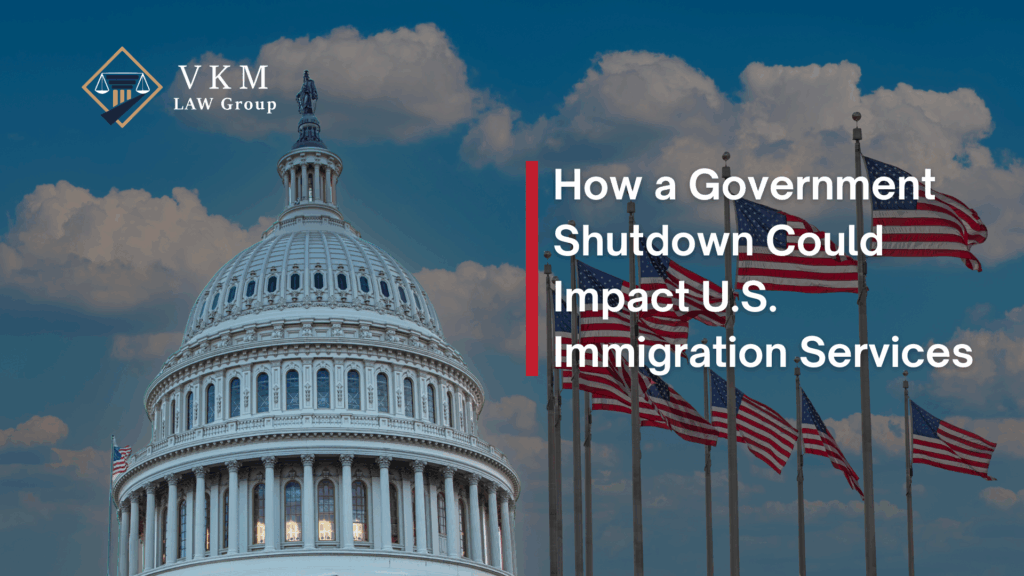
As Congress faces another funding deadline, the looming question for many immigrants, employers, and families is clear: What happens to immigration services if the U.S. government shuts down?
The short answer: some parts of the immigration system will keep running, others could slow down or pause entirely. The impact depends largely on how each agency is funded and which services rely on congressional appropriations.
Below is a breakdown of what typically happens during a government shutdown and what applicants and employers should keep in mind.
U.S. Citizenship and Immigration Services (USCIS)
✅ Generally remains open.
Because USCIS operates primarily on fee-based funding, most of its day-to-day services including processing applications and petitions, continue even during a shutdown.
⚠️ Programs that could be affected:
Certain initiatives dependent on federal appropriations, like the EB-5 Regional Center Program or the Conrad 30 waiver program for J-1 physicians, may experience disruptions.
💻 E-Verify:
In past shutdowns, the E-Verify system was temporarily unavailable, creating challenges for employers completing Form I-9 verifications. Employers should prepare for potential delays if this happens again.
U.S. Department of State (DOS)
💼 Visa and Passport Services:
Consulates and embassies usually continue processing visas and passports since they are also fee-funded. However, if staffing or resources are stretched thin, expect slower processing times.
🚨 Priority cases:
Urgent cases such as diplomatic needs or life-and-death emergencies are handled first.
U.S. Customs and Border Protection (CBP)
🛂 Ports of Entry Remain Open.
CBP officers are considered essential personnel, so inspection and enforcement continue. Travelers, however, may face longer lines or slower processing times.
U.S. Immigration and Customs Enforcement (ICE)
🚓 Enforcement Continues.
ICE removal operations remain active. Government attorneys generally continue appearing in court for detained cases, though work on non-detained cases may be delayed.
U.S. Immigration Courts (EOIR)
⚖️ Detained Dockets Proceed.
Immigration judges will continue hearing cases involving detained individuals.
🕒 Non-Detained Cases Delayed.
Hearings for non-detained immigrants are typically postponed, with new notices issued once funding is restored.
U.S. Department of Labor (DOL)
⛔ Most Impacted.
The Office of Foreign Labor Certification (OFLC) halts processing of PERM labor certifications, prevailing wage determinations, and other filings.
💻 The FLAG system. It is used for online filings, it becomes inaccessible until the government reopens.
🗓️ VKM Tip: Employers facing filing deadlines should submit applications early to avoid being caught in the shutdown window.
VKM Guidance
While a government shutdown does not stop all immigration processes, it can cause serious confusion, slowdowns, and compliance challenges, especially for employers and foreign nationals with time-sensitive cases.
At VKM Law Group, we help individuals, families, and businesses navigate these disruptions, stay compliant, and protect their immigration status.
If you’re uncertain how a government shutdown could affect your case or your company’s workforce planning, contact VKM today for tailored legal guidance.
Frequently Asked Questions
- Will USCIS stop accepting applications?
No. USCIS will continue processing most applications, though programs funded by congressional appropriations may be paused. - What happens to E-Verify?
E-Verify has been suspended during previous shutdowns, delaying employer I-9 verifications. - Are U.S. consulates abroad still issuing visas?
Yes, but expect limited operations or longer wait times unless the case is urgent. - Will immigration courts remain open?
Only detained cases continue. Non-detained hearings will be rescheduled once funding resumes. - What can employers do to prepare?
File early, anticipate processing delays, and stay in close contact with your immigration counsel.
Need help preparing for a possible shutdown?
📞 Contact VKM Law Group, our team is ready to guide you through every stage of the process and minimize the impact on your immigration goals.